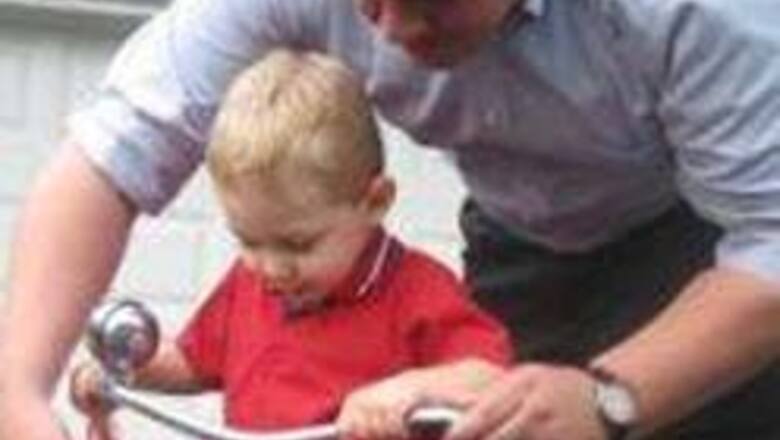
views
Is your toddler throwing temper tantrums? Does your 10-year old suffer from heartburn or loss of appetite before an exam? Has your teenager become withdrawn or rebellious? If you answered yes to any of these, your child may be stressed.
Dr PV Vaidyanathan, MD, DCH, a practicing child specialist from Mumbai for the last 17 years, helps you understand and reduce the stresses in your child's life, and make him more relaxed and balanced in his book Make Your Child Stress-Free.
We bring you an excerpt from the book -
Bitter are the tears of a child: Sweeten them.
Deep are the thoughts of a child: Quiet them.
Sharp is the grief of a child: Take it from him.
Soft is the heart of a child: Do not harden it."
- PAMELA GLENCONNER
WE, THE PARENTS
One of the toughest jobs in the world must easily be that of bringing up children, in a proper manner. Hence, in this section, we shall take a look at those who do this laborious, back breaking and often heart-breaking task—the parents.
Unfortunately for a majority of parents, life is neither easy nor straightforward. Most couples who get married have children, but for entirely different reasons.
For some, marriage followed by childbirth and child rearing, is often the aim or ambition of life. Many couples have a child by accident. Many have children in order to continue the family name.
Many who have a girl desperately want a boy, at least in our country. In some others, parents and other family members pressurize them, to have a child.
A certain group of parents want children to fulfill their own unfulfilled desires and aspirations. Many have children because they want to have children, because children give them immense joy, and a purpose in life.
When such are the varied reasons for having a child, it is but obvious that parents will also differ, in ways of bringing up children, as well as in their expectations from their offspring.
Most parents expect their children to be well-mannered, smart, good looking, honest, hard working, and to excel in studies, and in some extracurricular activity, like dance, music or sports.
PAGE_BREAK
A lot of what parents expect also depends on what other children within and without the family are doing. Hence, the concept of peer pressure, which is often used to describe teenage behaviour, is also applicable to adults.
Broadly speaking, the role of parents, as far as their children are concerned are many, but mainly involves caring and protection, providing basic amenities of food, clothing, shelter, education and love, being around to support their children emotionally, to act as a shock absorber or spring when their children need a cushioning, and to see that the inherent potential of the child is realized.
But not many parents are aware of all these duties. Even today, for most parents, child rearing involves satisfying the child's basic needs, and to help whenever the child asks for aid. Otherwise, most parents go through life, expecting their children to take care of themselves, and to take care of the parents, when they grow old.
For many, children tend to be investments for their future retired life, and it is often with this in mind, that these parents groom them. But children being what they are, and each child being unique and different in his or her physical, mental and creative assets, often fail to live up to their parent's expectations, leaving their parents deeply dissatisfied and disillusioned, in many aspects of life.
Many parents internalise these dissatisfactions and frustrations, but when they come under pressure they often crack, and tend to lash out at the child, verbally or even physically. This fact needs to be understood, when trying to unravel the mysteries of childhood stress.
PAGE_BREAK
Many parents often express a wish or desire that they would ideally like to attend some sort of classes, where parenting is taught, or where they can undergo some kind of training in bringing up children.
Though one does come across advertisements for parenting workshops, and books and magazines devoted to selling parenting techniques, it must be said that fortunately or unfortunately, there is no one shoe that fits every foot. Parents have to learn by trial and error, and what may be good for one child may not hold true for another.
The only thing that parents can do, when such is the case, is to try and tune in to their child, try to know and understand his or her strengths, weaknesses, likes, dislikes, behaviour patterns, personality and aptitudes, so that they can be ready to do the needful, both in terms of picking up problems early on, and in respect to being a beacon, which can guide their children to their respective goals and to their maximum potentials.
PAGE_BREAK
Children do not come out of assembly lines, and no two children, including twins are identical. One has to be aware ana alert, to one child's individuality, in order to see that he or she grows up and flowers into something beautiful.
But parenting is not without its own benefits. Someone who has been a parent will testify to the fact that he or she has learnt a lot, in bringing up the child. Some of the virtues that parents develop (I have included twenty of the commonest ones) when involved with bringing up children include:
Patience
Maturity
Inner strength
Humour
Love and affection
Caring and protective tendencies
Optimism and hope
Trust in the Almighty
Ability to multi-task
Anger and time management techniques
Improved teaching skills
Innovativeness
Positive thinking
Mental and physical stamina
Acceptance
Endurance
Improved communication skills
Consistency
Motivation
Sensitivity and sensibility
PAGE_BREAK
Parenthood is a big responsibility, which comes naturally to some, but is not so easy for the rest of us. One must constantly try and see that one does one's best, at this job. A parent must strive to be a guide, mentor, caretaker, friend, philosopher, and a role model, to his or her child. A child at birth is like a lump of clay.
How he or she will eventually turn out, is in the hands of parents. There is no point in blaming the clay, if the end results and the end product are not satisfactory. It is the worker who must shoulder the entire blame.
Having seen how stress, the environment, parents and children are intimately interwined with each other, we shall proceed to take a closer look at what is stress, its symptoms, its causes, effects and management.
If you want your children to improve, let them overhear the nice about them to others."
- HAIM GINOTT
The price of the book is Rs 150.




















Comments
0 comment